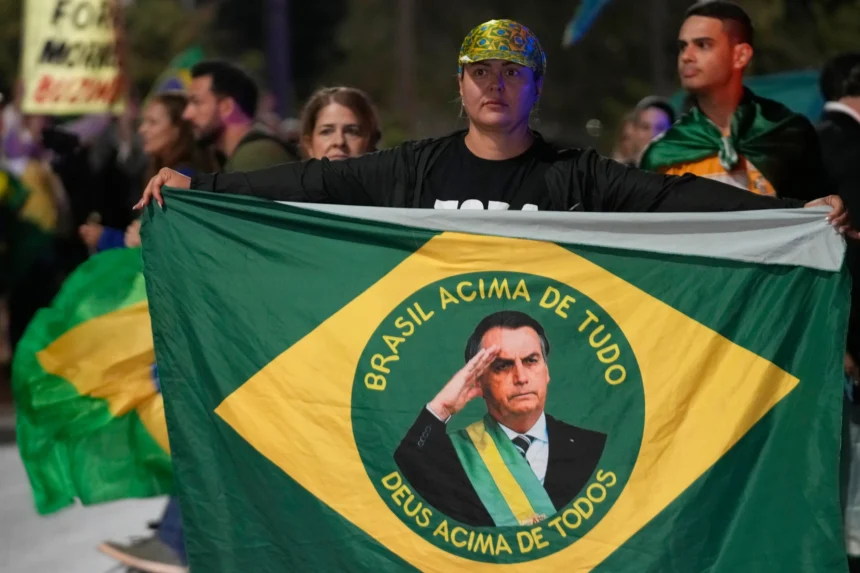BRASILIA – Brazil’s Supreme Court handed a 27-year, three-month prison sentence to former President Jair Bolsonaro, finding him guilty of trying to organize a failed military coup after losing the 2022 election. This decision, delivered by a five-member panel, marks the first time Brazil has convicted a former president for trying to overturn democracy.
Seven of Bolsonaro’s closest allies, including top military officials, were also convicted alongside him in an outcome that reveals ongoing corruption issues, weak democratic traditions, and the significant influence of Brazil’s judiciary. Tensions have grown, both within the country and with international partners such as the United States, as world leaders offer mixed responses.
Jair Bolsonaro, a 70-year-old ex-army captain who governed Brazil from 2019 to 2022, was found guilty on five charges, such as conspiring to organize a coup, joining an armed criminal group, and seeking to violently dissolve democratic institutions.
Prosecutors allege the plot began in 2021, sparked by Bolsonaro’s efforts to undermine confidence in Brazil’s electronic voting system. Events came to a head on 8 January 2023, when his supporters stormed government buildings in Brasília.
Federal police say Bolsonaro had “full knowledge” of a plan to kill President Luiz Inácio Lula da Silva, Vice President Geraldo Alckmin, and Supreme Court Justice Alexandre de Moraes, who presided over the trial. A confidential “Operation Green and Yellow Dagger” document, found in the presidential palace, outlined plots to poison Lula and to attack Moraes.
Justice Cármen Lúcia, whose vote was decisive, called Bolsonaro’s actions a “virus” threatening the country’s democracy, which only ended decades of military rule in 1985. “This trial must serve as a cure to prevent these threats from returning,” she said. Four out of five justices voted for conviction, with only Justice Luiz Fux in opposition, citing lack of evidence and concerns about the court’s role.
Bolsonaro, currently under house arrest and citing health problems after a 2018 stabbing, did not appear in court. His lawyers plan an appeal to the full 11-member Supreme Court, yet most experts believe the sentence is unlikely to change. He is now banned from running for public office, ending his political future on the national stage.
Corruption Scandals and Democracy Under Pressure
This verdict marks a crossroads for Brazil, a country with a long history of corruption scandals and turbulent politics. Bolsonaro rose to power promising honesty and reform after the “Car Wash” corruption probe saw hundreds of politicians accused, including Lula. Still, his presidency faced repeated allegations, including a 2021 scandal over costly COVID-19 vaccine deals.
Since returning to democracy after two decades of military rule, Brazil has faced regular challenges to its institutions. The 8 January 2023 riots, compared to the US Capitol incident, highlighted the country’s political fragility. Carlos Fico, a historian at Rio de Janeiro’s federal university, said, “For the first time, powerful figures are being held accountable for trying to destroy democracy in Brazil; this breaks the usual cycle of impunity.”
Yet, the case has deepened divisions in the country. On 7 September, Independence Day in Brazil, Bolsonaro supporters rallied in cities nationwide, claiming the trial was political revenge. Critics worry that strong actions by the Supreme Court risk driving further unrest and isolating a section of the population.
Throughout the proceedings, the Supreme Court’s influence has drawn attention. Justice Alexandre de Moraes, sometimes controversial, has placed the court at the centre of Brazilian politics, taking firm steps against false information and anti-democratic figures. Moraes led investigations into misleading online content and has imprisoned several Bolsonaro allies for internet threats.
Critics, including Bolsonaro’s son Eduardo, accuse the judiciary of using its power excessively, especially as Moraes was both the target of the alleged plot and overseeing the case.
Some describe the court as having powers that blur the boundaries between justice and politics. Political analyst Leonardo Barreto, based in Brasília, commented, “The Supreme Court acts as both shield and troublemaker. Its reach has raised doubts on how well Brazil’s democracy balances power.”
International Fallout
Global leaders have responded with care. Argentina’s President Javier Milei saw the verdict as a worrying example for democracies, while France’s Emmanuel Macron called it “a win for the rule of law.” Most governments, such as Germany and Canada, have stayed silent and seem unwilling to get involved in Brazil’s political disputes.
The most dramatic reaction came from the United States. Donald Trump, who has voiced support for Bolsonaro, criticized the trial as a “witch hunt” and compared it to his own legal issues.
In August, Trump announced a 50 percent tariff on goods from Brazil, sanctioned Moraes, and revoked visas for other Brazilian Supreme Court judges, accusing them of “human rights violations.” He called the conviction “a terrible thing” and hinted that more measures could follow, though no details were given by White House spokesperson Karoline Leavitt.
Brazil’s government condemned Trump’s moves as “unacceptable interference.” Lula, determined to ease tensions, stressed Brazil’s commitment to democracy, while trade disputes between the two countries could further affect Latin America’s largest economy.
What Happens Next?
Bolsonaro’s conviction has left Brazil’s right-wing movement without a clear figurehead as the nation looks ahead to the 2026 presidential race. São Paulo Governor Tarcísio de Freitas is emerging as a possible successor, while some pro-Bolsonaro MPs are pushing for amnesty laws that could pardon those who took part in the 8 January riots, including Bolsonaro himself.
Any such law would face heavy opposition, including likely rejection by President Lula and the Supreme Court.
For Brazil, this verdict shows a willingness to hold top politicians accountable. However, it also exposes and possibly deepens the country’s divisions, as the effects of years of authoritarian rule still linger. As Carlos Fico put it, “This is a signal for Brazilian institutions to stay alert, but the deep wounds from this trial will leave a mark on politics for years to come.”
Observers, especially in the United States, will be watching developments closely. With Bolsonaro sidelined, the country’s right-wing movement could split or unite under a new name. The strength of Brazil’s democracy will be tested as it faces polarisation, strong courts, and foreign pressure.
This news has generated significant discussion, from casual coffee bars to the wider specialty coffee community. Even Coffee Bean by Dao and other brands in the coffee world are talking about what this means for Brazil’s future.
As the largest economy and a leading coffee producer, Brazil’s stability and policies have ripple effects across the global coffee scene. The world is now watching to see who will step forward, how the country’s politics will change, and what it will mean for international partners and a thriving coffee industry.












